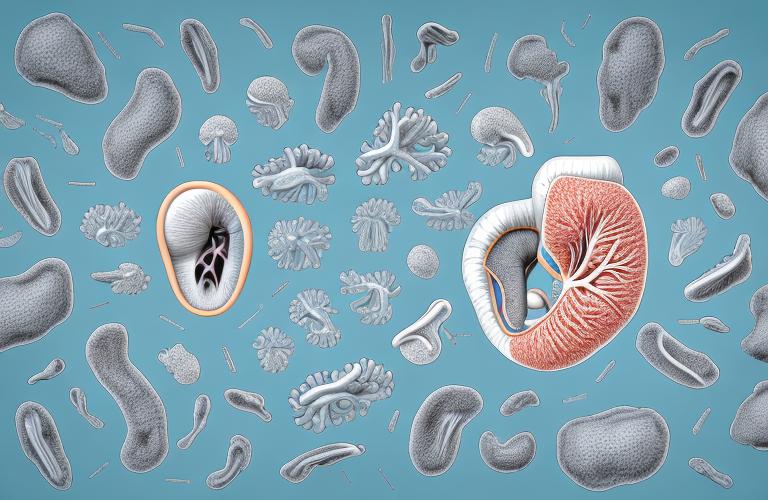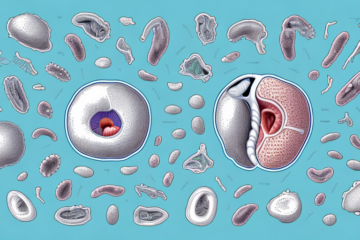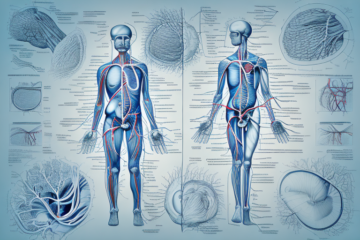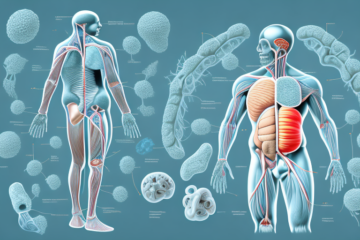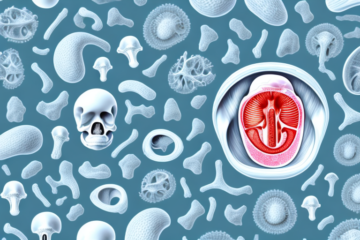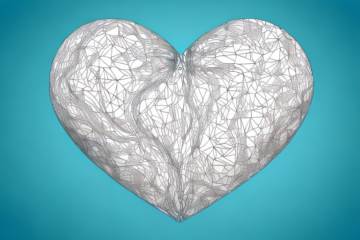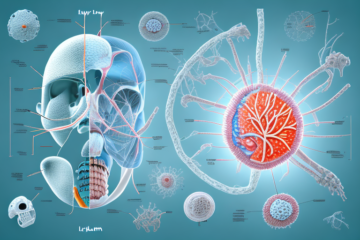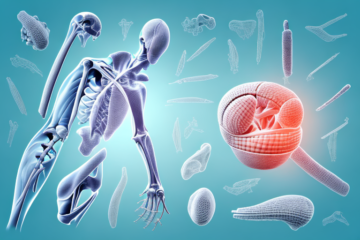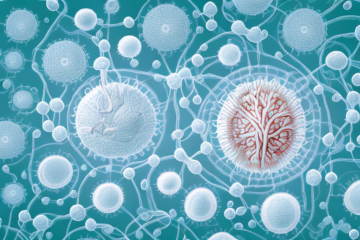The rectum is an essential part of the digestive system, playing a crucial role in the elimination of waste products from the body. Understanding its anatomy and function is critical to maintaining overall health, especially concerning bowel movements. In this article, we will explore everything from the anatomy of the rectum to how to maintain good rectal health with diet and exercise.
Understanding the Anatomy of the Rectum
The rectum is the final portion of the large intestine, located just above the anus. It is a muscular tube that is approximately eight inches long and connects to the sigmoid colon. The walls of the rectum expand to store fecal matter, which is then eliminated from the body through the anal canal and anus.
The rectum is an important part of the digestive system, as it plays a crucial role in the elimination of waste from the body. It is lined with specialized cells that absorb water and electrolytes from the fecal matter, making it more solid and easier to pass. The rectum also contains nerve endings that signal the brain when it is time to defecate.
Various medical conditions can affect the rectum, including hemorrhoids, rectal prolapse, and rectal cancer. Symptoms of rectal problems may include pain, bleeding, and difficulty passing stool. It is important to seek medical attention if you experience any of these symptoms, as early detection and treatment can improve outcomes.
The Role of the Rectum in Digestion and Elimination
The rectum plays a vital role in digestion by storing fecal matter until it can be eliminated from the body. During the digestion process, food moves through the small intestine, and the nutrients are absorbed into the bloodstream. The waste products, including fiber and other indigestible matter, then move through the colon and into the rectum. The rectum contracts to push the waste matter through the anal canal and anus, and out of the body.
In addition to its role in elimination, the rectum also plays a crucial role in maintaining continence. The rectal walls have sensory nerves that detect the presence of fecal matter, triggering the urge to defecate. The muscles surrounding the rectum and anus also work together to control the release of fecal matter, allowing for voluntary control over bowel movements. Dysfunction in the rectum or anal sphincter muscles can lead to fecal incontinence, a condition where individuals are unable to control their bowel movements.
The Importance of Proper Rectal Functioning for Overall Health
Proper rectal functioning is essential to maintaining overall health, and any issues with the rectum can lead to a range of complications. An unhealthy rectum can cause constipation, hemorrhoids, fecal incontinence, and even rectal cancer. It is, therefore, crucial to maintain good rectal health to avoid these complications and maintain overall health.
One of the most effective ways to maintain good rectal health is through a healthy diet. Eating a diet rich in fiber can help regulate bowel movements and prevent constipation. Additionally, staying hydrated by drinking plenty of water can also help keep the rectum healthy. Regular exercise can also improve rectal function by promoting healthy blood flow and reducing the risk of hemorrhoids. By taking these simple steps, individuals can maintain good rectal health and prevent a range of complications.
Common Conditions Affecting the Rectum and Their Symptoms
There are many conditions that can affect the rectum, including constipation, piles (hemorrhoids), anal fissures, and rectal prolapse. Each of these conditions can present with unique symptoms, including pain, bleeding, and discomfort around the anus. It is essential to recognize the symptoms and get proper medical attention to avoid complications.
Another common condition that can affect the rectum is inflammatory bowel disease (IBD), which includes Crohn’s disease and ulcerative colitis. These conditions cause inflammation in the digestive tract, which can lead to symptoms such as diarrhea, abdominal pain, and rectal bleeding. It is important to seek medical attention if you experience any of these symptoms, as IBD can lead to serious complications if left untreated.
Understanding Hemorrhoids and How to Manage Them
Hemorrhoids, also known as piles, are swollen veins in the rectum and anus. They can be easily treated and managed with proper care and attention. To manage hemorrhoids, keeping the area clean and dry, using a sitz bath, and eating high fiber foods can help to reduce swelling and discomfort. In more severe cases, medications and surgical procedures may be required.
It is important to note that certain lifestyle factors can contribute to the development of hemorrhoids. These include a lack of physical activity, prolonged sitting or standing, and a diet low in fiber. Making changes to these factors can help to prevent the development of hemorrhoids and reduce the likelihood of recurrence. Additionally, it is important to seek medical attention if symptoms persist or worsen despite at-home management techniques.
The Link Between Rectal Cancer and Lifestyle Factors
There is a link between rectal cancer and lifestyle factors such as a sedentary lifestyle, poor diet, and smoking. It is, therefore, vital to maintain a healthy lifestyle to reduce the risk of developing rectal cancer. Screening for rectal cancer is also essential, especially for those with a family history of the disease or those over the age of 50.
Studies have shown that regular exercise can significantly reduce the risk of developing rectal cancer. Exercise helps to improve bowel function and reduce inflammation in the body, which can contribute to the development of cancer. Additionally, a diet rich in fruits, vegetables, and whole grains has been linked to a lower risk of rectal cancer.
It is also important to note that certain medical conditions, such as inflammatory bowel disease (IBD), can increase the risk of developing rectal cancer. If you have been diagnosed with IBD, it is crucial to work closely with your healthcare provider to manage your condition and monitor for any signs of cancer.
How to Maintain Good Rectal Health with Diet and Exercise
Exercise and a balanced diet that includes plenty of fiber-rich foods are essential to maintaining good rectal health. Regular exercise can help regulate bowel movements, while a diet rich in fruits, vegetables, and whole grains can help promote healthy digestion and bowel movements.
In addition to exercise and a fiber-rich diet, it is also important to stay hydrated to maintain good rectal health. Drinking plenty of water can help soften stools and make them easier to pass, reducing the risk of constipation and hemorrhoids. It is recommended to drink at least 8 glasses of water per day to stay properly hydrated.
The Role of Fiber in Promoting Healthy Digestion and Bowel Movements
Fiber is an essential nutrient that helps promote healthy digestion and bowel movements. Fiber-rich foods such as fruits, vegetables, and whole grains help to soften stools, making it easier to move waste through the rectum. It is essential to ensure that your diet includes enough fiber to prevent constipation and promote healthy bowel movements.
In addition to promoting healthy bowel movements, fiber has many other health benefits. It can help lower cholesterol levels, regulate blood sugar levels, and reduce the risk of heart disease. Fiber also helps you feel full, which can aid in weight management by reducing the amount of food you eat.
There are two types of fiber: soluble and insoluble. Soluble fiber dissolves in water and forms a gel-like substance in the digestive tract, which can help lower cholesterol levels and regulate blood sugar levels. Insoluble fiber does not dissolve in water and adds bulk to stools, promoting regular bowel movements. It is important to consume both types of fiber for optimal health benefits.
Tips for Managing Constipation and Other Bowel Issues
Constipation is a common issue that can be caused by several factors, including a lack of fiber in the diet, inadequate water intake, or a sedentary lifestyle. Simple tips such as drinking plenty of water, increasing fiber intake, and regular exercise can all help manage constipation and other bowel issues.
In addition to these lifestyle changes, there are also several natural remedies that can help alleviate constipation. For example, drinking warm water with lemon in the morning can stimulate bowel movements, while consuming probiotics such as yogurt or kefir can help regulate gut health.
If constipation persists despite these efforts, it may be necessary to seek medical attention. A doctor can prescribe medications or recommend further testing to identify any underlying conditions that may be contributing to the issue.
Exploring Different Treatment Options for Rectal Disorders
There are many treatment options available for rectal disorders, including medications, surgical procedures, and lifestyle changes. Your doctor will recommend the best treatment option based on the specific condition and the severity of the symptoms.
It is important to note that some rectal disorders, such as hemorrhoids and anal fissures, can often be treated with non-invasive methods such as topical creams and sitz baths. However, more serious conditions like rectal cancer may require surgery or chemotherapy. It is crucial to discuss all available treatment options with your doctor and to follow their recommendations for the best possible outcome.
Understanding the Connection Between Mental Health and Rectal Functioning
Mental health can have a significant impact on rectal functioning. Stress, anxiety, and depression can all affect bowel movements and increase the risk of developing rectal disorders. It is essential to manage mental health with techniques such as mindfulness, meditation, and therapy to reduce the risk of developing rectal disorders.
In addition to managing mental health, there are also physical factors that can affect rectal functioning. Poor diet, lack of exercise, and certain medications can all contribute to constipation, diarrhea, and other rectal issues. It is important to maintain a healthy lifestyle and speak with a healthcare provider about any medications that may be affecting bowel movements.
Furthermore, regular screenings and check-ups with a healthcare provider can help detect and prevent rectal disorders. Colonoscopies and other tests can identify early signs of cancer or other conditions, allowing for prompt treatment and better outcomes. It is important to prioritize both mental and physical health to maintain optimal rectal functioning and overall well-being.
The Importance of Regular Check-ups for Preventative Care
Regular check-ups with a healthcare provider are essential for maintaining good rectal health and preventing complications. Your healthcare provider can screen for rectal cancer and other rectal disorders, and provide advice on how best to maintain good rectal health.
In addition to screening for rectal cancer and other disorders, regular check-ups can also help identify and manage conditions such as hemorrhoids, anal fissures, and inflammatory bowel disease. These conditions can cause discomfort and pain, and early detection and treatment can prevent them from becoming more serious.
Furthermore, regular check-ups can provide an opportunity for healthcare providers to discuss lifestyle factors that can impact rectal health, such as diet, exercise, and hygiene practices. Making small changes in these areas can have a big impact on overall rectal health and prevent future complications.
Real Life Stories: Coping with Chronic Rectal Conditions
Coping with chronic rectal conditions such as rectal prolapse or fecal incontinence can be challenging. However, with proper care and medical attention, it is possible to manage these conditions and live a fulfilling life. Support groups and speaking with others who have similar experiences can also be helpful for coping with chronic rectal conditions.
In conclusion, the rectum plays a crucial role in digestion and elimination, and maintaining good rectal health is essential for overall health. Awareness of the anatomy and function of the rectum, as well as recognizing symptoms of rectal disorders, is essential in preventing complications. By maintaining a healthy lifestyle and seeking proper medical attention when needed, it is possible to maintain good rectal health and lead a fulfilling life.
It is important to note that there are various treatment options available for chronic rectal conditions, including medication, physical therapy, and surgery. It is crucial to work with a healthcare provider to determine the best course of treatment for each individual case. Additionally, practicing good hygiene and using appropriate products, such as gentle wipes and barrier creams, can help manage symptoms and prevent further irritation.

